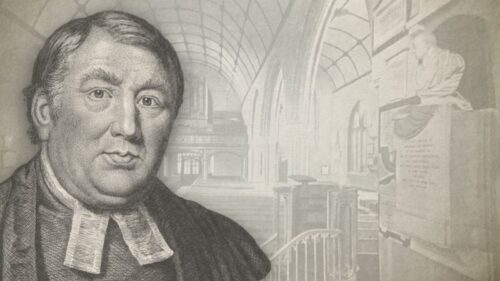
June 1—Morning Devotion
“The Lord said unto my Lord.”—Psalm 110:1
Some have called this Psalm, David’s creed. Certain it is, that there is scarce an article of a true believer’s faith, but what is in it. My soul, look through it this morning, if thou hast time, and see whether it is thy creed. If not, look at this precious portion of it, and ask of the Holy Ghost to teach thee the blessed things contained in it. “The LORD said unto my Lord:” that is, Jehovah said unto my Adonai. Observe, my soul, that here, as in many other parts of the bible, one of these words Load is in capital letters, the other in small characters. This no doubt was done by the translators, by way of telling the English reader that the two words in the original Hebrew are not the same. They had no better method of explaining the difference. But by using different sized letters, they meant to say that there is a difference, and the difference seems to be this: the word LORD, whenever used in the Bible in capital letters, signifies Jehovah; Father, Son, and Holy Ghost: not as a name of office in the work of redemption, but as intimating his own glorious incommunicable essence. The word Lord in small letters, Adonai, is very frequently (as in this Psalm) applied to Christ in this his gracious office as the Christ of. God, and of his people. And a most sweet and precious name it is. It signifies, in a double meaning, first his own personal, authority and power; and, secondly, that power as exerted and called forth into action for his redeemed. Look at thy Jesus, my soul, as thy Adonai this day, and every day, and. a thousand sweet and precious blessings such a view of him, as a ruler, and a support, and a sustainer, will open to thy meditation. Yes, all-lovely, all- powerful, all-gracious Adonai, thou art my Adonai! In this thy name, which is as ointment poured forth, would I contemplate thee. In this thy name would I rejoice all the day, and in thy righteousness would I be exalted.
Robert Hawker (1753-1827) was an Anglican (High-Calvinist) preacher who served as Vicar of Charles Church, Plymouth. John Hazelton wrote of him:
“The prominent features…in Robert Hawker's testimony…was the Person of Christ….Dr. Hawker delighted to speak of his Lord as "My most glorious Christ.” What anxious heart but finds at times in the perusal of the doctor's writings a measure of relief, a softening, and a mellowing? an almost imperceptible yet secret and constraining power in leading out of self and off from the misery and bondage of the flesh into a contemplation of the Person and preciousness of Christ as "the chiefest among ten thousand and the altogether lovely." Christ and Him crucified was emphatically the burden of his song and the keynote of his ministry. He preached his last sermon in Charles Church on March 18th, 1827, and on April 6th he died, after being six years curate and forty-three years vicar of the parish. On the last day of his life he repeated a part of Ephesians 1, from the 6th to the 12th verses, and as he proceeded he enlarged on the verses, but dwelt more fully on these words: "To the praise of His glory Who first trusted in Christ." He paused and asked, "Who first trusted in Christ?" And then made this answer: "It was God the Father Who first trusted in Christ."
Robert Hawker on the Biblical Covenants (Complete)
Robert Hawker's Poor Man's Morning Portions





